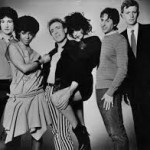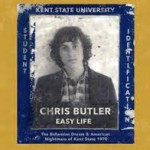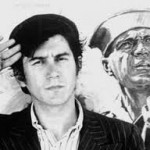Before college rock was a lifestyle, before it was even a cult, before it was even a rumor, there were people like Chris Butler.
Throughout the country in the early to mid 1970s, these people comprised an invisible minority shaping the future. They were long-hairs and short-hairs, huddled in university pubs or music and art high schools, lone-gunmen selling fanzines outside of old vaudeville houses, rabid fans of music that was barely on the radar being inspired to make music even further below detection. These pioneers absorbed all the more eccentric, exquisite and gorgeously culty musical traits of the 1960s – from Beefheart to the Byrds, from Gram Parson to the Grateful Dead, from Gong to the Move – and used the fertile Petri dishes of American college towns and cheap-rent dead cities to create the foundation of American independent music.
For Chris Butler, Ohio – specifically Akron, Cleveland, and Kent State – was where (far away from the dope sparks of the high-heeled boys in New York) Butler and his band, Tin Huey, began to invent American college rock (in collaboration with friends, compatriots, and fellow travelers like Pere Ubu, Devo, the Rubber City Rebels, the Bizarros, Rocket from the Tombs, and many etceteras). Like a similar scene being developed just a little bit later in Winston, Salem North Carolina, the music made by these bands would directly lead to some of the most high-profile college rock and punk rock of the 1970s, ‘80s, and ‘90s. Seriously, if you want to see where the sound of Our Generation came from, don’t look at the Bowery or the Sunset Strip: look at North Carolina and Ohio in the early and mid-1970s.
Chris Butler of Tin Huey went on to significant commercial success with the Waitresses (for whom he was the prime songwriter), but I have come not to rattle off Butler’s credits or bona fides, but to talk about his extraordinary new record, Easy Life.
Easy Life is vastly original, profoundly moving, deeply personally yet extraordinarily universal; it concerns itself with the most intimate, common, and human experiences and the most rare, historic, and tragic occurrences. Simply put, Easy Life is a concept album – actually, perhaps more of a biography in music, maybe even a (dreaded/dreadful word!) rock opera – about a young man coming to college at the end of the 1960s; his experiences are deliciously familiar, as he discovers freedom, sleeping late, girls, responsibility, evading responsibility, drugs, drink, and sex; but then the young man is centrally and integrally caught up in one of the signal events of the era: on May 4, 1970, the National Guard fired 67 rounds in 13 seconds on a group of unarmed students protesting the Vietnam War, killing four and profoundly wounding nine others. Butler was an eyewitness and a participant in the demonstration that was attacked. After the assault on the unarmed protesters, one of Butler’s best friends, Jeffery Miller, lay among the dead.
With grace, compellingly original music, and moving but deliberately ordinary words that underline how some young people who were a great deal like you and I ended up being pawns in tragic-history, Butler places that extraordinary event within the context of everyday college and artistic experience. This is so fucking important, because before anyone is a martyr, before anyone is a witness, before anyone is an unwilling participant in history, they were drunks, and clumsy artists, and dancers, and people cheating on their girlfriends and boyfriends, and people being cheated on, and people angry at the noisy neighbors, and excited about new movies and your friends’ sister, and people who owned crappy cars, and people who loved the Grateful Dead, and people who borrowed your drums.
Before I go further, here’s where to buy it/hear samples. http://www.futurefossilmusic.com/easylife.htm
Butler’s musical palette on Easy Life is dramatic, stark, varied, and entirely appropriate; it features archival acoustic recordings, full band recordings, home demos, all astutely sewn together (and linked by effective spoken word and expository material) to tell the story of how the profound tragedy of Kent State interjected itself into the normally abnormal lives of college students.
Much of the album’s music has the effect of being faux clumsy, which is to say the music is precise but spontaneous and affecting, exact but tumbling, occasionally evoking the idea of the Raspberries produced by Zappa or some weird dB’s/Oingo Boingo cross; likewise, there is definitely a hovering haze of the same Ohio smoggy pop machine that bred Tin Huey, Pere Ubu, and Devo. Often, it sounds like the work of an expert folk musician just beginning to discover progressive rock and proto-punk pop, which might accurately reflect Butler’s real-life musical perspective at the time of the events he recounts in Easy Life. Over all, this mix of audio sources implies a race against time, a race against memory, a perfect musical vocabulary for an album about memory that wants to be alive in that memory.
At one point, Butler sings “We knew one shining truth — we were immune,” and that underlines the profound depth of this album, and how this historical atrocity forever defined its’ witnesses.At times, conceptually and lyrically the album reminds me of Phil Ochs’ striking Rehearsals for Retirement, his 1969 masterpiece (largely) about how a generation’s hope and optimism died on the streets during the riots the Democratic Convention in Chicago in 1968. In fact, these two albums should be sold together. I am also going to cite one (vastly different) point of comparison: Easy Life is the easily the best original concept album/rock opera I’ve heard since the extremely different Bandage: The Rock Opera. Bandage is the deeply accomplished and entertaining piece from about the rise and fall of a Sunset Strip rock star, composed and performed by Los Angeles’s Pi Gamma band about fifteen years ago (I don’t want to take away space from Easy Life, but WHY has NO ONE picked up Bandage for staging/performances outside of Los Angeles? The thing never achieved the national audience it so richly deserved, and it is far more original than Rock of Ages, which clearly ripped it off, and the songs are fucking great).But back to Chris Butler’s Easy Life. Get it. It is an important, original and moving album, and makes the events of that horrible day, May 4, 1970, more alive than anything I’m aware of. Shit, they should teach this thing in schools.







